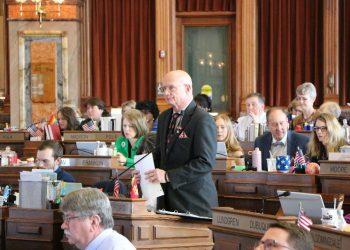DES MOINES, Iowa – After the December Revenue Estimating Conference predicted that the state of Iowa would finish the current fiscal year with net receipts of over $9 billion, representing a three percent increase from the previous fiscal year that ended with a surplus just shy of $1.24 billion, Republican lawmakers called for tax cuts.
“The December REC forecast again confirms a significant overcollection of Iowa taxpayer funds and we are going to give that money back,” Gov. Kim Reynolds said in a released statement. “Iowa’s economy continues to show very positive signs of growth. I will continue to fight to return these funds to the hands of hardworking Iowa taxpayers and explore significant tax cuts this legislative session that will make Iowa one of the most competitive states in the country. This overcollection of taxes is unethical and it must end.”
“Thanks to the Governor’s leadership and House Republicans’ conservative budgeting practices, Iowa’s economy remains strong. Currently, Iowa is taking in more money in taxes than the state needs,” Iowa House Speaker Pat Grassley, R-New Hartford, said.
“This overcollection is the people of Iowa’s money, and they deserve it back. Particularly as we are facing rising levels of inflation from the Biden economy, we must ensure Iowans keep more of their hard-earned money. Iowa House Republicans look forward to addressing this issue and finding the most effective way to lower taxes and return this money to Iowa taxpayers,” he added.
State Senator Brad Zaun, R-Urbandale, told Jeff Angelo on WHO Radio on Monday morning that he is among of group of legislators that will push for the elimination of the state’s income tax.
State Senator Joe Bolkcom, D-Iowa City, ranking member of the Iowa Senate Appropriations Committee, disagreed. He said the legislature could focus on tax cuts that target middle- and lower-income Iowans and smaller businesses, but not across the board tax cuts.
He also called for more spending, stating the revenue growth allows the legislature to make “significant investments in job training and apprenticeships; paid family leave; and affordable child care and housing.”
The Revenue Estimating Conference also estimated a 1.7 percent increase in net revenue, estimating net receipts of just over $9.2 billion, in the next fiscal year compared to the current fiscal year.
The panel also predicted that income tax receipts would be done, primarily because of tax cuts passed during the 2021 legislative session. They estimate personal income tax revenue would be down by 0.8 percent compared to the last fiscal year, and corporate income tax would be down by 5.7 percent. They estimate sales/use tax revenue will grow by 5.2 percent; however, that estimate could change with an economic downturn.
















